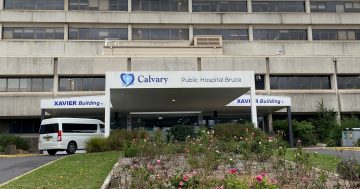
Norovirus is sometimes referred to as the winter vomiting disease.
There has been an outbreak of norovirus in two of Calvary Public Hospital’s medical wards, with patients’ families and friends being asked to limit their visits.
Norovirus is one of the most common reasons for large outbreaks of vomiting and diarrhoea and Calvary is actively trying to manage the outbreak.
“A range of measures have been implemented to contain the outbreak and still enable Calvary to provide uninterrupted emergency, medical and surgical services,” a Calvary representative said.
“We are seeking the assistance of patients’ families and visitors. We are asking families to limit visitor numbers and the duration of visits to patients in hospital at present.
“Obviously, we do not want people with current or recent norovirus symptoms coming into the hospital. We also ask visitors to comply with any instructions provided by clinical staff.
“In order to reduce the risk of transmission of norovirus we have implemented the use of Personal Protective Equipment, and limited staff and patient movements in the affected wards.”
The Calvary spokesperson said that the outbreak has been reported to the ACT Chief Health Officer who will be regularly updated on the situation.
“Norovirus is one of the most common reasons for large outbreaks of vomiting and diarrhoea, and typically occurs in settings where people gather in close proximity, such as cruise ships, nursing homes and hospitals. It is sometimes referred to as the winter vomiting disease,” the spokesperson said.
“It is important to recognise that everyone is susceptible to norovirus. It lives everywhere in our community – homes, schools, shopping malls, aged care facilities, clubs, houses and hospitals to name just a few.
“Everybody’s best protection against contracting or transmitting norovirus is good hand hygiene using soap and hot water.
“Norovirus can be a very serious infection for the elderly and the very young, but it poses the greatest risk to people with pre-existing medical conditions.
“People who contract norovirus who are otherwise healthy should not go to work or school, maintain good hydration, and rest until the symptoms pass. It generally affects people for a period of 24 to 48 hours and can be quite uncomfortable and inconvenient.”



















